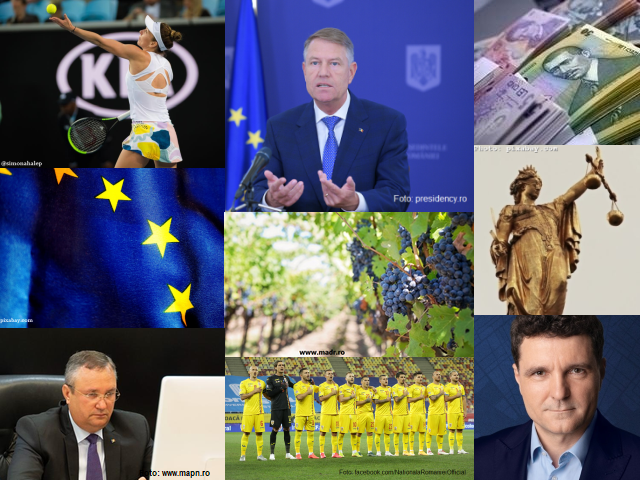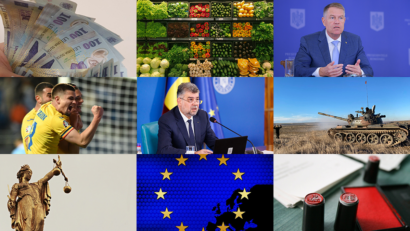THE WEEK IN REVIEW
Romanian head of state Klaus Iohannis was invited by his American counterpart Joe Biden to a new round of consultations via video conference with allied leaders from the EU and NATO, along partner states, in the context of continued illegal military aggression by Russia against Ukraine. The parties analyzed the strategy to support Ukraine and response measures from the international community in order to counteract Russias actions, focused on extended sanctions. The participants reiterated their determination to provide economic, humanitarian, and security support for Ukraine. President Iohannis spoke about the importance of maintaining allied and transatlantic unity, and firmly condemned the crimes committed by Russian troops against civilians. At the same time, the head of state emphasized the impact that this crisis has on the security situation on the eastern flank of the alliance, especially in the Black Sea area. Klaus Iohannis also referred to the need to create a NATO rapid response task force on Romanias territory. At the same time, he called for decisive and coordinated action to wean away from energy dependence on Russia, and also underlined that the present sanctions regime has proven ineffectual.

Leyla Cheamil, 21.04.2022, 15:29
President Klaus Iohannis in video conference with EU and NATO allied leaders
Romanian head of state Klaus Iohannis was invited by his American counterpart Joe Biden to a new round of consultations via video conference with allied leaders from the EU and NATO, along partner states, in the context of continued illegal military aggression by Russia against Ukraine. The parties analyzed the strategy to support Ukraine and response measures from the international community in order to counteract Russias actions, focused on extended sanctions. The participants reiterated their determination to provide economic, humanitarian, and security support for Ukraine. President Iohannis spoke about the importance of maintaining allied and transatlantic unity, and firmly condemned the crimes committed by Russian troops against civilians. At the same time, the head of state emphasized the impact that this crisis has on the security situation on the eastern flank of the alliance, especially in the Black Sea area. Klaus Iohannis also referred to the need to create a NATO rapid response task force on Romanias territory. At the same time, he called for decisive and coordinated action to wean away from energy dependence on Russia, and also underlined that the present sanctions regime has proven ineffectual.
Romanian — American talks
Romanian Foreign Minister Bogdan Aurescu and US Secretary of State Antony Blinken had a telephone conference on Monday on the consequences of Russias military aggression against Ukraine, and on ways of adequate situational management and response. Bogdan Aurescu submitted his governments evaluation of the security developments on NATOs eastern flank and in the Black Sea area. He detailed the complex action taken by the Romanian authorities in support of Ukraine in the political, logistical, and humanitarian areas. The head of Romanian diplomacy also underlined the importance of speedily acting on the decisions made at the extraordinary NATO meeting of March 24, especially in creating sooner the special task force in Romania, as a first step in balancing and consolidating NATO presence on the eastern flank. In turn, Secretary Blinken expressed gratitude on behalf of his country for the regional role taken on by Bucharest, and for its support for Ukraine and vulnerable partners in the region, including Moldova. The American official said that Washington was committed to protecting the territories of Romania and all its allies, especially first line countries, as Romania now stands. Also on Monday, Defense Minister Vasile Dincu and his American counterpart Lloyd Austin spoke on the telephone about the evolution of the security situation in the Black Sea. Minister Dincu thanked the United States for its commitment and consistent contribution to eastern flank security for NATO. Two concrete examples of the solidity of the transatlantic alliance are the repositioning of Stryker units and of F-16 and F-18 air wings.
The offshore bill allowing for natural gas extraction in the Black Sea is under debate in the Senate
The offshore bill allowing for natural gas extraction in the Black Sea was on Tuesday on the agenda of the Permanent Bureau of the Senate in Bucharest. This bill gets emergency status for debate, after being endorsed by expert institutions. It is estimated that the Senate, as a first debate forum, would greenlight it in May. PM Nicolae Ciuca said that the offshore law will ensure stability and legal predictability to relevant businesses in terms of independence from gas supplies from the Russian Federation. The gas volume attributed to the Romanian sectors in the Black Sea is estimated at 200 billion cubic meters, with the largest part in the Neptune Deep perimeter, operated by OMV Petrom and ExxonMobil.
100 million Euro in aid for the Republic of Moldova
The foreign ministry in Bucharest saluted the approval by the Senate, as a decision making forum, of the bill to ratify the accord to implement the technical and financial assistance program worth 100 million Euro as a grant to the Republic of Moldova. The accord was signed by the prime ministers of Romania and Moldova, Nicolae Ciuca and Natalia Gavrilita, on February 11, in Chisinau. Romania is set to prop up Moldovas resilience in sectors essential for society, such as the energy sector, transportation and its infrastructure, environmental protection, climate change, public works, healthcare, education, culture, and research.
IMF adjusts estimations for Romanian economic growth in 2022
The IMF has adjusted downwards significantly its estimations for the growth of the Romanian economy this year, from 4.8% forecast in the autumn to 2.2% at this point. The budget bill for 2022 was based on an expected 4.6% growth. In terms of inflation, the IMF estimates an average growth in prices of 9.3%, two and a half times more than the growth anticipated in autumn of last year. The inflation trend will slow down to 4% next year. Globally, the institution points out that the prospects for the world economy have worsened substantially as compared to estimates made in January, mainly due to the Russian invasion of Ukraine, which caused a humanitarian crisis in Eastern Europe and induced sanctions against Moscow. Present estimates for world economic growth stand at 3.6% in 2022 and 2023.




























